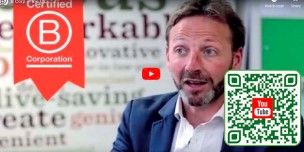DOES REGEN AG MATTER?
Written by Richard Pike from COOK

A broken System
My interest in sustainable food began somewhere in the mid 2000’s when, working for a UK farming group, we ended up importing lettuce into the UK, by air, in spring, to satisfy the demands of a major customer. I was shocked that no one seemed to be particularly concerned about the impact that sort of practice had. Two generations of shoppers have been taught to expect a 12-month supply of everything, from Strawberries to Cauliflower, for it to look perfect across the board and, worst of all, to pay as little as possible for it. You cannot fault the service given to the consumer because of this model but what about the producer and the planet both of whom get left behind in the race to the bottom?
About COOK
Luckily enough, just as I was about to go and become a beach bum, (until I found out that the pay wasn’t great), almost by accident, I landed a job at this fledgling, ready meal business that had a heart and was open to an alternative view. COOK has always had purpose at its core, back then the business was focused on quality above all else however it was already working hard to establish links to good local businesses and to put down a marker to determine what “purpose” actually meant. The business has always been focused on people, community, and quality because it’s the right thing to do rather than as a result of a strategic approach. Becoming a founding UK BCorp in 2014 really helped to cement our purpose into something tangible.
Protein is, and always was, by far our biggest single ingredient spend area. So naturally this is where we started focusing our efforts to effect change and animal welfare was the obvious starting point. We knew that this wasn’t the whole answer and that actually the problem was a much bigger multi- faceted one. One that required a focus not just on welfare or carbon but on other outputs like soil health, biodiversity, water quality etc. but we needed to start somewhere. We have now achieved five compassion in world farming awards and begun to work closely with a number of suppliers on how we can help improve in other areas and reduce our scope 3 emissions as well.

The Crisis
Of course, we are all fully aware of the climate crisis and the very real need to take bold and urgent action. We have set science-based targets and pledged net zero by 2030, in common with many other businesses. However, there are thousands who haven’t made any commitments at all, as of yet. We are also fully aware that agriculture gets a lot of the blame and that the work done to enhance and protect food security, safety standards and quality goes unsung in the face of environmental pressure. It is incumbent on us to help shepherd a change in perception and to educate consumers in order to improve. It’s also no longer enough anymore just to be sustainable, if we really want to change things, we have to put something back.

Commercial reality
People expect brands that they trust to be “doing the right thing” but what does that mean in reality? Someone, somewhere, must pay for doing business this way to understand and realize the true value of food.

Sometimes it’s difficult for us in the industry to work out what good looks like so how on earth can we expect a consumer to differentiate between the provenance of a collection of shiny packs covered in claims in a supermarket aisle or to understand that just because it has a union flag all over it does not necessarily mean it’s the best option? Legal minimum country standards never go far enough and although there is a plethora of private standards in operation, all of whom perform a great service, many are focused on a single element of a complicated system. We are not experts in this space, we need to rely on those who are. We need a set of established and agreed guidelines or outcomes that allow us to work out equivalence and more importantly communicate that, in a simple way, to every stakeholder to uncover the true value.

The future
Any food business not truly active in the regenerative space within five years will risk being left behind and on the road to obsolescence. Getting behind efforts to put something back, we hope to be able to help influence and support all those we work with, to ensure that they are still viable and successful in the future. One of the key aspects of our business philosophy is relationships and we believe that they are the most important aspect of any partnership. The willingness to provide long term support and share the challenges is paramount to the success of both the producer and the customer if we are going to make any real difference. We always invite our suppliers to come and visit us to see how we use their product for two reasons.
Firstly, it connects the producer with the reason we are asking for the very specific things we ask for and how those things fit into our process. But more importantly to connect the people handling the product with the reality, that what’s before them is the result of someone else’s blood sweat and tears, whose livelihood depends on it and is not just something to necessarily cast aside because it doesn’t meet the expectation on the day. Where we can, we showcase the people who work with us to create a true connection from end to end and that’s what tells the story.
Someone once told me that we, as a retailer, needed to give the customer what they wanted but I disagree with the sentiment. It may be a little arrogant but it’s now time for us, as producers, to give people what they need and to tell them why they need it. We can’t turn the clock back 50 years, nor should we, but we can learn a lot from the experiences of our forefathers in realizing the true value of both food and the land that provides it to us. We need to play our part in educating our consumers to that effect. There is no silver bullet of course and no one size fits all solution but a truly sustainable future is ours for the taking if we are brave enough and I want to be able to tell my kids that we did our best to right the wrongs.
The system is truly broken but Regenerating Agriculture is part of the solution………….
